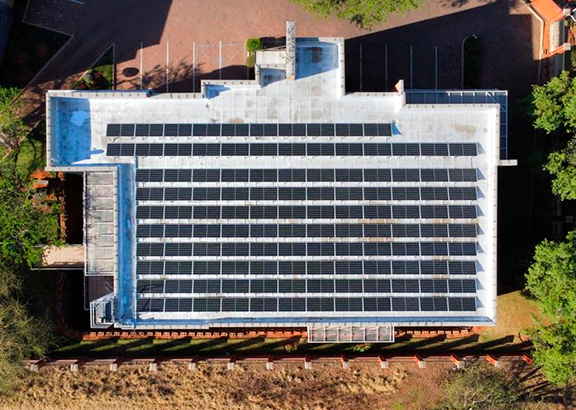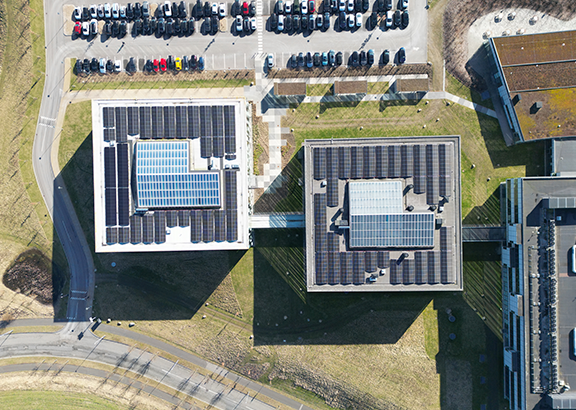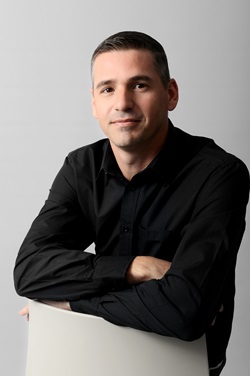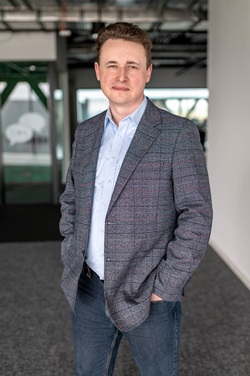How Demant reached 21% renewable electricity in 2023
By 2023, Demant’s total share of renewable electricity was 21%. The current amount of renewable electricity is an accumulation of great efforts across business areas and sites who have worked diligently to introduce renewable electricity into their locations.
Across the Group, Demant has committed to transition to renewable electricity. The aim is to cover 50% of the company’s electricity consumption with renewable electricity by 2025 and 100% by 2030. In 2023, Demant reached 21% renewable electricity. This electricity transition responds to the commitment Demant has to reduce its climate change impact.
Renewable electricity is defined by the United Nation as a type of energy derived from natural sources that are regenerated at a higher rate than they are consumed. Common types of renewable electricity are the ones derived from wind and solar sources (What is renewable energy? | United Nations).
On- and off-site sources
There are two types of renewable electricity depending on where the electricity is generated: on-site and off-site. Whereas on-site is generated by the same entity that consumes it, through for example solar panels or wind turbines installed on the premises, off-site is generated by a third-party somewhere else and delivered to the site directly or to the electricity grid. The latter is regulated through market instruments, such as Energy Attribute Certificates (EACs) to ensure that the electricity consumed by an entity corresponds to the amount of renewable electricity added to the grid, and to ensure that the renewable electricity is only accounted once.
Renewable electricity in Demant
In 2023, Demant used renewable electricity from both on-site and off-site sources (see box above).
98.7% of the Group’s total renewable electricity consumption comes from off-site electricity provided by local electricity vendors through the grid. Once the electricity is in the grid it is impossible to determine what type of electricity an entity receives, whether it is renewable or not. The vendors therefore provide an Energy Attribute Certificate (EAC) equivalent to the consumption to guarantee that the electricity used comes from renewable sources. The contributors to this off-site renewable electricity are Hearing Aids Operations in Poland, Audika, Audilab and Prodition in France and Inventis (Diagnostics) in Italy.
The on-site electricity is generated in Demant Headquarters (Kongebakken) in Denmark, Demant South Africa and Diagnostics in Poland and corresponds to the 1.3% of the Group renewable electricity; all of it is generated through the use of solar panels.
Demant South Africa

Demant Headquarters (Kongebakken)


Economic and environmental impact
Considering the national electricity shortage situation in South Africa and its implications for the business in terms of electricity availability and use of diesel for the back-up power generator, it was decided to incorporate renewable electricity into the business and guarantee the electricity supply to keep the company running as normal. According to Kai Esterhuizen, Head of Shared Services, Demant South Africa, this is what kickstarted the site’s transition towards more renewable electricity sources:
“Naturally, we want to support the Group in achieving its targets and it aligns perfectly with our focus on the triple bottom line, where we consider the financial performance but also the social and environmental impacts of our business. For us, on-site solar panels has become a way to not only do something that would be better for the climate, but also guarantee a constant electricity supply in a time with a lot of uncertainty and additional costs (for the back-up generator”, he says.

Considers sustainability in new buildings
Diagnostics work to continuously improve the environmental performance of their sites, and this is also evident in the way environmental sustainability is considered in for instance decisions about a new building. Pawel Muklewicz, General Manager, DGS Diagnostics in Poland, explains how solar panels was a natural path to take when the new building was designed:
“It is a combination of factors that led us to the installment of the solar panels. Under our environmental management system we aim at reducing our environmental impact, we know of and want to support the Group’s renewable electricity ambitions and are also aware of the EU trends around renewable electricity. The new building was therefore a perfect occasion to investigate the market and find the best solutions,” he explains.
The panels currently provide around 10% of the annual electricity demand of the facility and according to Pawel, they will continue to assess alternatives to increase the use of renewable electricity for this location in the future.

A win-win situation
In France, the Hearing Care business Audilab started to consider and reduce its environmental impact even before the company joined Demant. Ludovic Perrin, Quality, Safety and Environment Auditor, Audilab France, shares that becoming part of the Group presented a possibility to push this effort even further:
“When we joined Demant in 2021 we were aware that Audika and Prodition in France already had existing joint off-site renewable electricity agreement with an electricity supplier, which we could then join. To switch to renewable electricity was the obvious next step for us to take. It enables us to support the renewable electricity transition of the Group, while the fact that we are three companies help us secure a better price than if one of us had done the transition alone. A win-win situation,” he concludes.
As a next step, Ludovic also shares that Audilab will install solar panels at their headquarter and begin generating on-site renewable electricity in 2024.
Towards 100%
Demant will continue to increase its share of renewable electricity until reaching the target of 100% by 2030.
This year, the Group is expanding its on-site generation by increasing the electricity generation capacity at Headquarters in Denmark and by adding new solar generation in Hearing Aids Operations in Mexico and Audilab headquarters in France.
Off-site renewable electricity will complement the Group's efforts to ensure that the transition is aligned with its targets and commitments.
Back to latest news